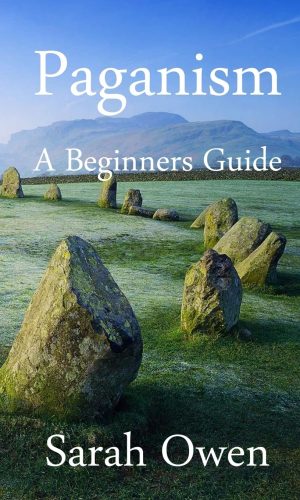Witchcraft & Wicca
-
2025 Lunar and Seasonal Diary – Northern Hemisphere: Seasonal planner for 2025
From Australia’s most trusted witch, Stacey Demarco, comes the 2025 Lunar and Seasonal Diary!A beautifully produced diary with full-colour pages and spiral binding that allows the pages to lay flat, and with extra space for recording notes. The diary includes lunar timings and explanations of the moon phases and their impact on humans, with practical magical suggestions to get the most out of the energies of each season. Packed with invaluable tips and techniques ranging from increasing your wealth to improving your relationships, boosting your vitality, and magnifying your personal power to removing obstacles and fears that are holding you back in your life. This diary comes complete with gods and goddesses for each month and seasonal spell castings and invocations for specific moon phases, including equinoxes and solstices.
Read more
£12.00£14.80 -
Paganism: A Beginners Guide to Paganism
Interest in Paganism is steadily increasing and, while rooted in ancient tradition, it is a living religious movement. With its reverence for all creation, it reflects our current concern for the planet. This introductory guide explains: • what Paganism is • the different Pagan paths • what Pagans do • how to live as a Pagan Paganism is one of the fastest growing spiritual movements in the West today. Pagans are those who worship the ancient pre-Christian Gods of our ancestors and of our lands. Originally, the word ‘Pagan’ was applied to those who worshipped the Gods of the pagus, which in Latin means ‘locality’. Pagan was also used in another sense by Christians – to mean ‘country dweller’. ‘Heathen’, of German origin, is also used by those who worship the Northern European Gods. Heathen means the someone of the heath who worships the Gods of the land. ‘Paganism’ is not a word that our ancestors would have used and it is seen by some as derogatory. Outside Europe, Pagans often reject it as an example of Western colonialism denigrating their traditional beliefs. In West Africa, the followers of indigenous spirituality refer to their beliefs as African Traditional Religion. In the West, the terms Native Spirituality, Celtic Spirituality, European Traditional Religion, the Elder Faith and the Old Religion are also used to describe the Pagan religions. Pagans have a variety of beliefs, but at their core are three which many would share: 1) The Divine has made itself manifest through many Deities in different places and at different times. No one Deity can express the totality of the Divine. This can be called polytheism – the Gods are many. 2) The Divine is present in Nature and in each one of us. This can be called pantheism – the Divine is everywhere. 3) Goddess and God: The Divine is represented as both female (Goddess) and male (God) while understanding that It is beyond the limitations of gender. 4) A fourth principle that some Pagans would share is called the Pagan Ethic: ‘If it harms none, do what you will.’Read more
£6.60 -
Paganism: Pagan holidays, beliefs, gods and goddesses, symbols, rituals, practices, and much more! An Introductory Guide
What is paganism? Is it an heretical faith that stands in opposition to Christianity? It is devil worship? The answer is no times three. “Paganism” does not refer to a single religion, but to a collection of earth-centric polytheistic philosophies that harken back to belief structures that pre-date Christianity. Pagans of all types believe that there are many paths to reach a harmonious relationship with deity. No single one is more valid than another. Since pagans do not see the world as locked in a cosmic struggle between good and evil, they do not recognize the Christian concept of Satan nor do they worship him. The notion of “pagan” as “heretic” is only valid when seen through the lens of Christianity. In her latest book, author Riley Starr offers a gentle introduction to the world of earth religions aimed at the beginner. Using Wicca, Druidry, and Odinism as exemplars, Starr explains what it means to function both as a pagan within a group and as a sole practitioner. With suggestions for starting a ritualistic life and for adopting the use of protective symbols, Starr opens the door for new followers of paganism to take the first steps in their own journey and encourages them to embrace a lifelong study of the deities and symbols that speak exclusively to them. Pagan holidays, beliefs, gods and goddesses, symbols, rituals, practices, and much more!Read more
£7.80



